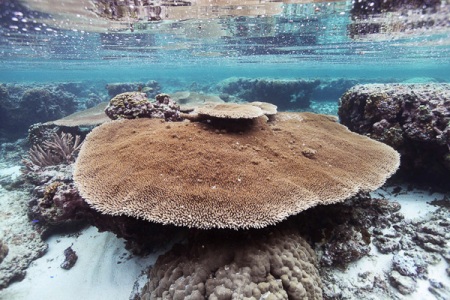Jan 10 2013
In a future shaped by climate change, only the strong – or heat-resistant – will survive. A study published this week in the Proceedings of the National Academy of Sciences opens a window into a genetic process that allows some corals to withstand unusually high temperatures and may hold a key to species survival for organisms around the world.
 Shallow-reef corals off Ofu Island in American Samoa. 'If we can find populations most likely to resist climate change and map them, then we can protect them,' Stanford researcher Stephen Palumbi said.
Shallow-reef corals off Ofu Island in American Samoa. 'If we can find populations most likely to resist climate change and map them, then we can protect them,' Stanford researcher Stephen Palumbi said.
"If we can find populations most likely to resist climate change and map them, then we can protect them," said study co-author Stephen Palumbi, a senior fellow at the Stanford Woods Institute for the Environment and director of the Hopkins Marine Station. "It's of paramount importance because climate change is coming."
Coral reefs are crucial sources of fisheries, aquaculture and storm protection for about a billion people worldwide. These highly productive ecosystems are constructed by reef-building corals, but overfishing and pollution plus rising temperatures and acidity have destroyed half of the world's reef-building corals during the past 20 years. The onslaught of climate change makes it imperative to understand how corals respond to extreme temperatures and other environmental stresses.
Although researchers have observed that certain corals withstand stresses better than others, the molecular mechanisms behind this enhanced resilience remain unclear. For their study, Palumbi, Stanford postdoctoral scholar Daniel Barshis and other researchers looked at shallow-reef corals off Ofu Island in American Samoa to determine how they survive waters that often get hotter than 90 degrees Fahrenheit during summer-time low tides.
Utilizing cutting-edge DNA sequencing technology, the scientists examined the corals' gene expression when subjected to water temperatures up to 95 degrees. "These technologies are usually applied to human genome screens and medical diagnoses, but we're now able to apply them to the most pressing questions in coral biology, like which genes might help corals survive extreme heat," Barshis said.
Heat-resistant and heat-sensitive corals had a similar reaction to experimental heat: hundreds of genes "changed expression," turning on to reduce and repair damage. However, the heat-resistant corals showed an unexpected pattern: 60 heat stress genes were already turned on even before the experiment began. These genes are "frontloaded" in heat resistant corals – already turned on and ready to work even before the heat stress begins.
"It's like already having your driver's license and boarding pass out when you get close to the TSA screener at the airport, rather than starting to fumble through your wallet once you get to the front of the line," Palumbi said.
The findings show that DNA sequencing can offer broad insights into the differences that may allow some organisms to persist longer amid future changes to global climate. "We're going to put a lot of effort into protecting coral reefs, but what happens if we wake up in 30 years and all our efforts are in vain because those corals have succumbed to climate change?" Palumbi said.
As with strong corals, finding species most likely to endure climate change – "resilience mapping" – is the first step toward protecting them, Palumbi said. "The solutions that we're looking for must, at least partially, be out there in the world."